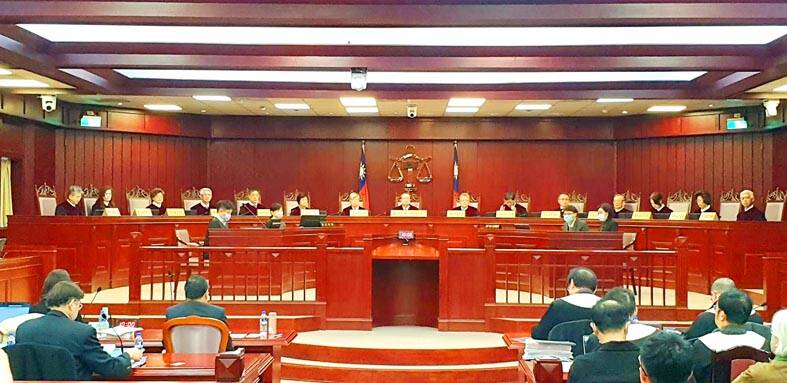The Constitutional Court yesterday ruled that slander as a punishable crime is constitutional, but its scope should be better defined.
The court heard 31 petitions for constitutional interpretation, including 20 filed by judges who said that slander was not clearly defined in practice and was not in line with the principle of unambiguous law.
Writer Chang Ta-chun (張大春) and media personality Neil Peng (馮光遠) also filed for a constitutional interpretation of slander after they were found guilty by local courts, saying that the rulings infringed on their right to free speech.

Photo: Yang Kuo-wen, Taipei Times
Chang was ordered to pay NT$3,000 for defaming the late pundit Liu Chun-yao (劉駿耀) in 2014 after calling him “shameful,” while Peng was ordered to pay NT$5,000 to former National Security Council secretary-general King Pu-tsung (金溥聰) in 2015.
Item 1, Article 309 of the Criminal Code states that a person who publicly insults another shall be sentenced to short-term imprisonment or a fine of not more than NT$9,0000. In practice, swear words and comments denigrating others as animals are common.
Meanwhile, Item 2, Article 309 states that a person who by violence commits an offense specified in the preceding paragraph shall be sentenced to imprisonment of not more than one year or a fine of not more than NT$15,000.
The Constitutional Court yesterday said that the law should not consider name-calling during arguments sufficient grounds to sustain defamation and that the environment, context, tone and reason for the argument should be taken into consideration.
The court said that whether one’s speech should be considered slander should be judged on how much it would affect the reputation of the person slandered, and whether said comments were conducive toward public affairs, literary matters or an expression of art, or positively contribute to academia or other professional domains, and whether, in isolated cases, one’s reputation should take precedence over one’s freedom of speech.
Only under such parameters would public slander not go against constitutionally guaranteed freedom of speech, it added.
Following the Constitutional Court’s interpretation yesterday, lawyers said that it would significantly change the landscape of the judiciary and greatly reduce the number of defamation lawsuits.
During a debate at the Constitutional Court last year, Ministry of Justice representative Kuo Yung-fa (郭永發) said that Article 309 of the Criminal Code was established to uphold people’s reputations, which is considered a basic right guaranteed by the Constitution.
Peng said that his comments, while poignant and acerbic, should be taken as political commentary, adding that Article 309 does not offer protection for commentary that could fit the criteria for slander.

MAKING WAVES: China’s maritime militia could become a nontraditional threat in war, clogging up shipping lanes to prevent US or Japanese intervention, a report said About 1,900 Chinese ships flying flags of convenience and fishing vessels that participated in China’s military exercises around Taiwan last month and in January have been listed for monitoring, Coast Guard Administration (CGA) Deputy Director-General Hsieh Ching-chin (謝慶欽) said yesterday. Following amendments to the Commercial Port Act (商港法) and the Law of Ships (船舶法) last month, the CGA can designate possible berthing areas or deny ports of call for vessels suspected of loitering around areas where undersea cables can be accessed, Oceans Affairs Council Minister Kuan Bi-ling (管碧玲) said. The list of suspected ships, originally 300, had risen to about 1,900 as

Japan’s strategic alliance with the US would collapse if Tokyo were to turn away from a conflict in Taiwan, Japanese Prime Minister Sanae Takaichi said yesterday, but distanced herself from previous comments that suggested a possible military response in such an event. Takaichi expressed her latest views on a nationally broadcast TV program late on Monday, where an opposition party leader criticized her for igniting tensions with China with the earlier remarks. Ties between Japan and China have sunk to the worst level in years after Takaichi said in November that a hypothetical Chinese attack on Taiwan could bring about a Japanese

Right-wing political scientist Laura Fernandez on Sunday won Costa Rica’s presidential election by a landslide, after promising to crack down on rising violence linked to the cocaine trade. Fernandez’s nearest rival, economist Alvaro Ramos, conceded defeat as results showed the ruling party far exceeding the threshold of 40 percent needed to avoid a runoff. With 94 percent of polling stations counted, the political heir of outgoing Costa Rican President Rodrigo Chaves had captured 48.3 percent of the vote compared with Ramos’ 33.4 percent, the Supreme Electoral Tribunal said. As soon as the first results were announced, members of Fernandez’s Sovereign People’s Party

MORE RESPONSIBILITY: Draftees would be expected to fight alongside professional soldiers, likely requiring the transformation of some training brigades into combat units The armed forces are to start incorporating new conscripts into combined arms brigades this year to enhance combat readiness, the Executive Yuan’s latest policy report said. The new policy would affect Taiwanese men entering the military for their compulsory service, which was extended to one year under reforms by then-president Tsai Ing-wen (蔡英文) in 2022. The conscripts would be trained to operate machine guns, uncrewed aerial vehicles, anti-tank guided missile launchers and Stinger air defense systems, the report said, adding that the basic training would be lengthened to eight weeks. After basic training, conscripts would be sorted into infantry battalions that would take